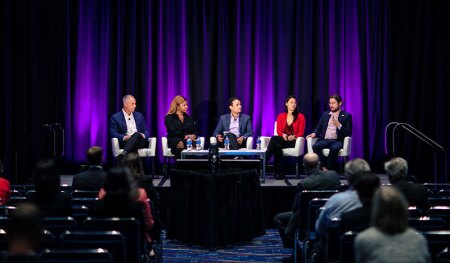Give Chicago credit for its boldness. When the old Michael Reese Hospital, dating to the 1880s, closed in 2009, the city rounded up the money to buy the 50-acre (20 ha) site, added more land around it, and then submitted a bid to host the 2016 Summer Olympics with a new stadium replacing the hospital as the centerpiece.
Chicago eventually lost that bid but has not given up on the site since, despite its location in Bronzeville, a minority neighborhood known for crime, low incomes, and vacant housing. After years of planning, developers are nearing the launch of a $3 billion mixed-use project that provides a lesson in municipal fortitude—the product of countless meetings over the past five years with the lead developer, Chicago-based Farpoint, and a long line of community groups, bankers, tenants, and architects.
“It was difficult to put this deal together,” said Ranadip Bose, a senior vice president at SB Friedman Development Advisors in Chicago, who helped referee the process. “It could have cratered over a single issue, like land price.”
Access 2021 ULI Fall Meeting sessions on Knowledge Finder.
A request for proposals on the site went out from the city in October 2016, and the team led by Farpoint, called GRIT Chicago (the acronym denotes Global Research and Integration Team), got the green light to proceed in 2017. The backers were an eclectic group that included Loop Capital Management, McLaurin Development Partners, Draper & Kramer, Chicago Neighborhood Initiatives, and the Bronzeville Community Development Partnership. An advisory council of 20 members joined with expertise in culture, design, and transportation, and a master plan was drafted, followed by five years of zoning and entitlement efforts.
Scott Goodman, Farpoint’s founding principal, hardly needed convincing to get involved. With the city paying to tear down the hospital, Farpoint was presented with a clear-cut site of almost 100 acres (40 ha) on Chicago’s Lake Michigan waterfront that was located just south of the McCormick Place convention center.
Goodman got his start years ago redeveloping old cold-storage buildings in Chicago’s Fulton Market neighborhood, since grown into a major destination for other commercial development that followed. In Bronzeville, he saw an even bigger opportunity.
“This is on the lakefront, next to the largest convention center in the Western Hemisphere, and we’re not displacing anybody,” he said in a concurrent session recounting the process. “We have an amazing chance to make an impact here.”
Not all the financing is lined up yet, so the city is making it easy on GRIT by agreeing to sell it the Bronzeville land in pieces. Phase one, slated to break ground later in 2022 with construction continuing until 2026, will encompass 13 acres (5 ha) anchored by the ARC Innovation Center, with an Israeli-based life sciences company called Sheba Medical Center agreeing to be lead tenant in the 500,000-square-foot (46,500 sq m) building to be delivered in two years or so. Nearby will be senior housing, a public park, and a new public transportation station.
Morgan Malone, a development director at Farpoint, explained that eventually 20 percent of the housing going up in Bronzeville will be affordably priced, and 10 percent of all retail space will be discounted 20 percent below market rates. The goal is nearly two-thirds participation from minority-owned firms in construction, she said. The building will require 9,100 construction workers, and the finished development will create 9,900 full-time jobs with a $3.1 billion impact on the community.
Phase two of the development will span 38.5 acres (15.5 ha) with construction proceeding between 2023 and 2041, Malone said. It will include 6.8 million square feet (632,000 sq m) of commercial space, including offices, retail, residential, hospitality, public open space, and even a data center. Each of those uses got approval from local citizens groups. “This wasn’t just town halls that we held, where we took input and walked away,” Malone said. “The community groups were totally integrated in the process. I attended 70 meetings in one year myself.”
On the city’s side, the process was streamlined from the start. “It helped that we had a clear vision of our priorities and goals for this site,” said Tim Jefferies, deputy commissioner for the city’s Department of Planning and Development. He and developers hit numerous snags in planning. But “at the end of the day it was about problem-solving,” he said.
Cynthia Roubik, the assistant commissioner leading the Department of Planning and Development’s central planning region, said the city was willing to be flexible on everything from floor layouts to building heights (capped, in the end, at 350 feet [107 m]). Staffers came equipped with experience gained on other megaprojects. One is 78 Chicago, rising on 62 acres (25 ha) just south of Chicago’s downtown and developed by Related Midwest on an investment of $7 billion. Another is One Central, encompassing more than 9,000 residential units and 22 million square feet (2 million sq m) on a 35-acre (14 ha) site near Soldier Field. Landmark Development has pegged the cost at a titanic $20 billion.
In the world of commercial real estate, it turns out, Chicago makes no small plans.






